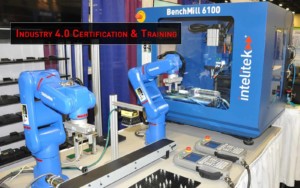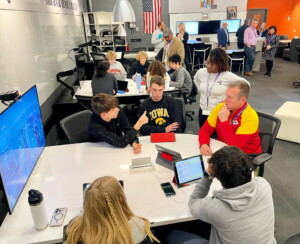How Can Educators Build Support Systems for Students Eyeing Technician Jobs?
Key Points
-
Integrating technical skills into the high school curriculum can inspire and prepare students for diverse roles. This approach is key to fostering equity and inclusivity in the job market.
-
By forging partnerships with community colleges and technical schools, high schools can democratize access to education and ensure students from all backgrounds have equal opportunities for success in technical fields.
-
High schools can expand career possibilities by providing apprenticeships as viable and lucrative alternatives to traditional four-year degrees.

By: Dr. Parminder Jassal
Job markets worldwide are buzzing with tech-driven transformations. With robotics and automation leading the charge, there’s a whole universe of new careers unfolding for those with a knack for tech.
What’s interesting is that a lot of these jobs do not require an expensive four-year college degree.
This article explores how high schools can be the launchpad for students eyeing technical careers. Community colleges, technical programs, apprenticeships, and innovative skills to jobs platforms all offer effective ways that schools can pave the way toward highly fulfilling and well-paid technician roles.
The Growing Demand for Technician Jobs
Currently, the US boasts over 700,000 employed technicians within the professional, technological, and healthcare sectors. The majority of these technicians are employed by Fortune 500 companies. A robotics technician working for one of these companies earns an average salary of over $67,000.
The surge in demand for technician jobs isn’t slowing down. Robotics technician roles in the US are experiencing a robust annual growth rate of 1.64%. Certain specialized positions, such as wind turbine service technicians, rank among the fastest-growing occupations nationwide. California, Texas, and Massachusetts lead the pack in employing technicians, with states like Wisconsin, Indiana, and Iowa seeing the highest growth in job vacancies and rates.
Rethinking Post-High School Pathways
Given these figures, it’s high time to broaden our perspective on what constitutes a successful post-high school journey.
While about 70% of recent grads head straight to four-year colleges, there’s an important conversation to be had about the remaining 30%— for whom the traditional college route may not be a preferred or feasible option. This group represents a significant portion of young adults searching for alternative pathways to success.
Vocational training, community college programs, and apprenticeships offer viable routes to securing well-compensated careers. In addition, platforms like Unmudl offer short courses that equip learners with skills directly aligned with specific job roles, offering an efficient path to employment for many students.
The journey to a fulfilling career doesn’t always start at a university. Our role as educators is to illuminate the diverse paths available—whether through apprenticeships, technical schools, or new skills to jobs platforms.
Dr. Parminder Jassal
Each pathway provides access to in-demand skills, such as robotics programming, automation system maintenance, and advanced manufacturing techniques. They challenge the notion that a four-year degree is the only avenue to a meaningful career.
Accessibility and Equity in Technical Careers
Technician roles are accessible to students from every background and social class. This inclusivity goes a long way in breaking down traditional barriers to a career in a technical field. High schools can significantly level the playing field by actively promoting and supporting such career paths.
They can be especially helpful in making students aware of and prepared to take on the technical and vocational opportunities available to them. This effort involves providing active guidance and the necessary resources to pursue technical careers. Educators at the high school level can make sure every student, no matter their circumstances, has the opportunity to secure meaningful and well-paying technician jobs.
Practical Steps for High Schools
High schools can become catalysts for change by steering students toward exciting technician careers. Here are a few successful programs and strategies that exemplify how this can be achieved:
- Technical High School Partnerships: In Minnesota, the Minnesota State – Advanced Manufacturing Education Alliance collaborates with high schools to offer dual-enrollment courses. Students gain hands-on experience in manufacturing technologies, preparing them for immediate employment or further education in engineering and advanced manufacturing.
- Apprenticeship Programs: The Youth Apprenticeship Program in Wisconsin connects high school students with apprenticeships in various trades, including automation and robotics. This program blends classroom learning with on-the-job training, providing students with a comprehensive understanding of technical skills and real-world applications.
- Tech-Focused Charter Schools: Brooklyn STEAM Center in New York offers specialized programs in fields like computer-aided design and electromechanical engineering. Students work on industry-specific projects and connect with businesses and colleges, gaining valuable skills and insights into their future careers.
Key Skills Educators Should Emphasize for Aspiring Technicians
As educators, it’s imperative to guide students toward acquiring the skills most relevant in today’s technician roles. This ensures they’re prime candidates for success in their chosen fields.
Here are a few essential skills:
- Automation & Robotics: Proficiency in managing and maintaining cutting-edge automated systems.
- Electrical Systems: A solid grasp of electrical circuits and a commitment to safety standards.
- Mechanical Systems: Knowledge about mechanical components and how they come together to function.
- Programming for Automation: Skills in specific programming languages, like Python or PLC ladder logic, are essential for modern automation.
- Troubleshooting & Problem Solving: The knack for identifying and resolving issues within complex systems swiftly.
- Preventive Maintenance: An understanding of regular maintenance tasks to prevent unexpected system failures.
- Adaptability: A readiness to embrace and utilize new technologies and methods.
- Critical Thinking: Logical reasoning skills to solve technical challenges innovatively.
High schools are the critical piece linking students who are not keen on a four-year college degree with emerging job prospects in technical fields.
It’s time to forge partnerships, integrate tech-centric courses into the high school curriculum, and discuss diverse career avenues.
Dr. Parminder Jassal is the CEO of Unmudl, a leading Skills-to-Jobs® marketplace for developing skills through hands-on training, propelling workers into job roles with the nation’s leading employers.







Engineering Colleges In Chandigarh And Mohali
Explore engineering colleges in Chandigarh and Mohali offering specialized polytechnic courses designed for a successful career. From mechanical to electrical engineering, these programs provide hands-on training, industry exposure, and practical skills essential for thriving in today's competitive job market. Prepare for a dynamic future in engineering with our comprehensive curriculum.
best schools in Greater Noida
The Shri Ram Global Universal School, one of the best schools in Greater Noida for the 2024-25 academic year, offers an exceptional blend of modern facilities and a robust curriculum. Renowned for its student-centric approach, the school focuses on holistic development through innovative teaching methods. The campus boasts state-of-the-art infrastructure, including well-equipped labs, libraries, and sports facilities. Parents seeking top-tier education for their children will find the school’s affordable fee structure and comprehensive admission process appealing. Similar to top schools in Noida, The Shri Ram Global Universal School stands out for its commitment to academic excellence and overall student growth.